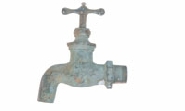The Engineers Without Borders society at Bristol - which has more than 200 student members - is currently working on plans to upgrade the city's main aqueduct.
They secured $17,000 in funding by winning the prestigious Mondialogo Engineering Award - sponsored by UNESCO and the motor manufacturers DaimlerChrysler - following their presentation before a panel of judges in Berlin.
Their successful bid was based on a joint initiative with an engineering institute in Havana - the Instituto Superior Politécnico José Antonio Echeverría, or CUJAE.
Current EWB society vice-president Carlos Fernandez-Aballi, who led the Bristol end of the initiative, has just returned from his native Cuba to continue his Masters degree course in engineering design.
The 21-year-old said many of the problems facing Cuba stemmed from the country's deteriorating infrastructure and lack of overseas investment as a result of the continuing economic blockade imposed by the United States.
He said: "We wanted to establish a link with an institute in Havana as well as bring together industry and academia to find solutions to the country's problems.
"We approached CUJAE and they said they would love to help do this and they will help provide the facilities as well as staff to get this project started.
"The first project will be looking at modernising the main aqueduct in Havana to improve the water supply for the city.
Carlos explained more than 50 per cent of the water pumped into Havana is lost through leakages and for many in the city the supply is only every two days.
The aqueduct is more than 100 years old and serves a population of around 2.2 million - one of the largest urban centres in the Caribbean.
Built between 1858 and 1893, it is called the Albear Aqueduct after its chief engineer and designer Francisco de Albear who died before its completion.
It was meant to alleviate the chronic shortage of clean, drinking water which had plagued the city since its was established by Spanish in the 16th century.
It takes its water from the nearby Vento Springs and links into an earlier water distribution system.
Carlos said: "A group of engineering students here in Bristol has been looking at the problems already and we are keen to take on similar challenges elsewhere.
"For instance, we are also looking into the technology surrounding pure plant oil engines for use in Ghana with a team from Germany."
He said the EWB society at Bristol has also received approaches from students at the University of Bath who are keen to form their own group
Carlos said: "We want to work with anyone who wants to find solutions to problems in developing countries, not just engineering problems either."
Engineers Without Borders (EWB) was first formed by a group of engineering students at Cambridge University in 2003 as way of helping provide solutions to problems facing countries where the expertise may not be readily available.
